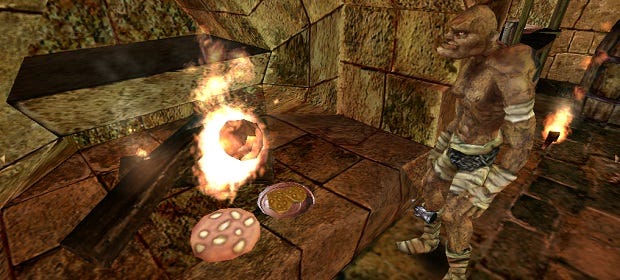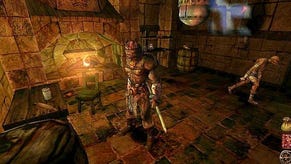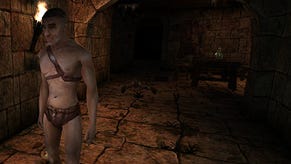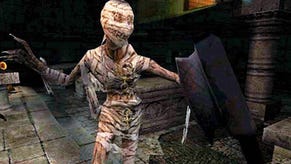Arx Again Later: How Arx Fatalis Bridged RPG Eras
Going underground
Confession time: I don't like dungeon crawlers. The very name says it all. Why would anyone want to go to the non-sexy kind of dungeon? And crawling - the form of movement reserved for times of serious injury and distress - around a dungeon? It's a recipe for a dreary, ugly casserole, served by a skeleton archer in a rusty slime-edged prison bucket with a bowl of kamikaze rats.
But then there's Arx Fatalis [official site], released in 2002 by Arkane Studios. I should hate it. It's made of brown tunnels echoing with ambient dripping and distant wailing. It's full of goblins and trolls and spiders and rats. You start in an Easily Escapable Prison, naked, with amnesia. It should bore me rigid, but through some arca... through some recondite formula it turns these uninspiring tropes into an imperfect, but unique and underappreciated brew.
It starts with the setting. A stock fantasy world is hit by a meteor, forcing survivors to live in underground networks connected only by the hardy few in the Travellers Guild, who brave the surface for trade like their counterparts in Metro 2033. Humans are on top, their allies underneath, and more danger the deeper you go. Naturally, this also gives rise to the game's basic structure, where you the stabbing-addicted hero alternate between offloading junk onto shopkeepers, and plumbing the depths to maim and pillage anything that doesn't look like you.
I said "unique" earlier and that's not really fair, as Arx is clearly a tribute to Ultima Underworld, powered by then-modern hardware and design standards. Arkane dared use the unholy concept of streamlining, and the results speak for themselves. They were more concerned with the player's actions than on creating a perpetual murder machine, giving it a plot-driven, fairly sedate pace. There's less focus on loot and redundant items, as most swords and armour are either better than what you have or not worth carrying back. This means your equipment will likely remain static throughout much of the game, and progress is defined more by events and your stats, and you spend less time comparing your Stick of Greater Snailpoke to every Egg Of Anonymous Screeching you find.
So far so underwhelming. But where Arx Fatalis comes together is in its sense of place. While the setting limits its size and palette, the caverns and tunnels that make up its world feel right. Human areas are open, stubbornly timber-heavy miniatures of a typical fantasy town, while the friendly-but-dim trolls live simple, cramped lives hewn directly from the rock, and more mysterious races build curious, threateningly alien structures. There are of course wilder areas, home to More Rats and Inevitable Spiders, dotted with crystals to mine and shallow pools sustaining plants you can pick.
The first person perspective and interface are a huge part of this feeling. A right click brings up an inventory without pausing, much like that of System Shock 2. It's not a separate thing that stops the game, some bureaucratic abstraction in a genre often undermined by them; it's more like poking around in a pocket for that tenner you swear you had while approaching a till with a bag full of shopping. It also affects how you play, rewarding you for preparation in advance, as the alternative is fumbling in a panic to poison your weapon or equip a scroll while someone's swinging a sword in your face.
Preparation is even more important for magic users, as Arx has one of the most interesting magic systems I've ever seen. Magic consists of runes, and casting spells means drawing the proper runes in the air. Get the shapes and combinations right and your spell will work. It's genuinely difficult, and frustrating at first, but then it should be, right? We're talking about exploding people with a touch, conjuring fire from your hands. Casting spells demands the proper points on your character's sheet, sure, but that just makes it possible. The act of performing is dependent on your skill as a player, just as your fighting character needs you to guide his swings, and a sneaky type will be hopeless if you don't direct him through the proper paths.
As absurd as it is to describe magic as "authentic", it feels more so than clicking to fire off spells like they're glorified bullets, or swearing as random numbers decide that you've fizzled. It rewards forethought, as in a compromise between instant magic and the D&D approach of preparing spells overnight, you can spell and save three spells in advance, to be cast later without the pressure. Excellently, even NPC casters can be seen writing runes in the air.
Combat, too, feels lively and involving. It's simple by modern standards, and mostly means charging up power strikes (holding the attack button) and trying to catch enemies with them while dodging their own swings. An embryonic form of the combat from Arkane's later Dark Messiah, it feels more natural than the combat of its contemporaries because you have direct control in a way that's frankly still too scarce. You swing an axe, and if you see your weapon hit them, your weapon has hit them. No dice, no tricks, no fault but your own. Hey, you could have run away, dead boy.
Roaming opportunities are restricted by geography, so the details of each area become important. Trivial scripted events give some illusion of life, like castle guards waking up and grumbling as they file out of the barracks, or the goblin fisherman who appears on a previously bare ledge. So it is too with the minor crafting elements, as you can make some basic tools, brew potions, catch and cook fish, or bake bread from scratch. The possibilities are limited, but serve to bring the world to life a little - watching food cook on a fire adds little of practical value after the opening hour, but removing that minor interaction from the environment would be like taking the pump action out of the shotgun in Doom.
The more overt work is done by the NPCs. How you feel about them will likely depend on your reaction to the trolls, and particularly the goblins, who feature prominently at the start. They speak a ridiculous pidgin English that you'll either cringe at or adore (keep an eye out for my favourite NPC, the outrageously, inexplicably French goblin), raising them above their Generic Evil expectations. They're a high point, however, as the voice work is uneven, even dull, and dialogue is merely serviceable.
There are no conversation options, only a few alternative ways to complete some quests, typically by butchering everyone. Here it treads the line between casting you adrift and leading you by the nose - you'll need to pay attention here and there. While none of the quests are a Mensa puzzle, you'll have to use some initiative to keep things moving. You can, for example, accidentally start a fight with and subsequently wipe out humanity's closest allies rather than ask them for a plot trinket. Not that anyone I know would be that stupid, of course.
However much I analyse it, Arx Fatalis feels like a bridge between its older, detailed but abstruse inspiration, and more modern, action-oriented but patronising fare. The 2000s may have been the era of "RPG elements", but first person fantasy romps are still thin on the ground, and that Arx stands alone is a great shame. It feels like the start of a series that never was, largely as it fought both Neverwinter Nights and Morrowind for our attention and money, and consequently never quite gained what it deserved.
The world could do with a focussed dungeon-crawling counterpart to the sprawling, systemic Excel With Dice of Morrowind. Yes, it's another of those "they could have done so much with this setting in a sequel" games, but let's not damn it with the "flawed" label that often implies; Arx Fatalis isn't a Great Game, but it is a great game. Sometimes that's enough.




















